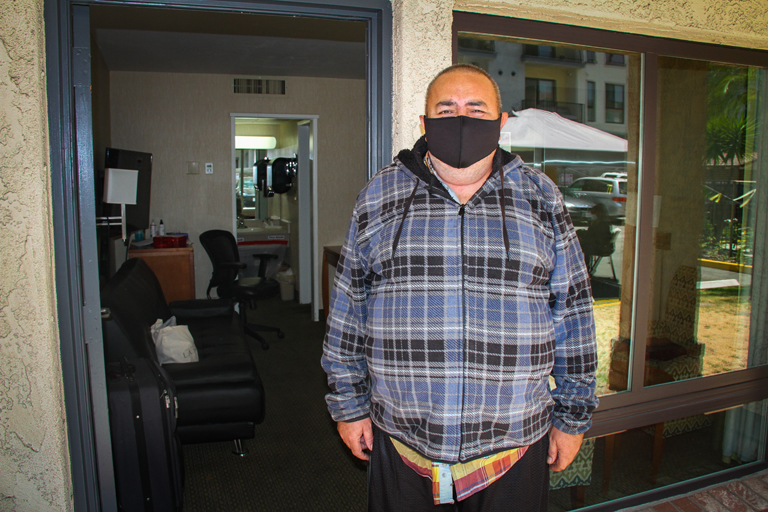Homeless numbers that were on the decline are on the rise again since COVID-19 hit. But local organizations are stepping in to lend a hand.

Gevik Aghajani has been at a Glendale hotel for the last two months, a beneficiary of one of the new programs Ascencia has put in place thanks to the grant money received.
.
By Mary O’KEEFE and
Charly SHELTON
Homelessness has been an issue that has been very visible and yet something that, as a society, we seem to have become accustomed to seeing. The increasing numbers of tents under freeways have become familiar landmarks.
COVID-19 has brought some long-needed attention to the homeless issues across the country and has made finding solutions a priority.
In the 2020 homeless count that was done in January, Glendale saw a 30% decrease in homelessness while the greater Los Angeles area saw an increase. But after the COVID-19 pandemic began, Glendale saw a subsequent increase in the number of homeless.
Ivet Samvelyan is the Glendale Community Services manager. She said across Los Angeles County advocates are working to get unsheltered individuals and families sheltered, while recognizing and working with the issues of inequality. In the greater LA County area there is a large population of Black and Hispanic homeless.
“In terms of [Glendale] homeless, I can tell you the [largest] populations we are dealing with is the White population and next is the Black population that is experiencing homelessness,” she said.
During the homeless count in Glendale, the majority of those who had experienced homelessness for the first time cited rent increases for the reason they were on the street. But now, due to COVID-19, the new homeless cite rent increases, unemployment and illness as the top three reasons for finding themselves homeless.
The City of Glendale recently received $3 million in federal Emergency Solutions Grant funds to address the risk of homelessness, housing and employment of those impacted by COVID-19.
“Getting this money means that globally and nationally people are recognizing homelessness as a nationwide challenge,” said Samvelyan. “We [in Glendale] are ready to combat this challenge.”
The funding Glendale received, including the additional grant from HUD [Dept. of Housing and Urban Development] of over $2 million, will be put toward supporting the homeless and getting them housing as well as helping those who are on the verge of homelessness.
“We currently have about 200 households in the City of Glendale that are part of our homelessness housing programming,” Samvelyan added.
That is the way Samvelyan, her staff and support services have been working on the homeless issues in Glendale. They understand that there is no quick fix but instead they focus on longtime solutions.
“We are targeting specifically homeless prevention,” she said. “And then we are educating the community, the landlords and our clients through various coordinated efforts with regard to all the available resources that all have hotlines.”
Samvelyan and her team target and triage unsheltered individuals and families and match them with the correct resources. What she discovered by speaking with some of her unsheltered clients is that there was a need to find ways to communicate and collect information. She found that for some of her clients coming to the outreach offices was difficult so her staff now goes to them, getting information to them and from them.
The fastest growing homeless population in Glendale is families, followed by middle-aged males with substance abuse problems. Samvelyan and her team continue to reach out to those who are in need.
“Even though half the world was staying at home, Homeless Services became the top system of care providing all types of services, not only for our general population that are at risk but also for low-income [people], including our unsheltered population,” she said. “My team and I are on the streets talking to people and understanding what the needs are.” Samvelyan’s team leverages services from organizations such as Ascencia, a housing service, and Family Promise of the Verdugos in determining the needs of the homeless.
The real need during the pandemic and beyond, said Samvelyan, is landlords who are willing to rent to those who are working to climb out of homelessness.
“We want to get folks into housing so no one is on the streets,” she said. “That is our goal.”
But she has met reluctant landlords who are concerned about renting to those formerly homeless. The City is working on identifying hotels and other similar types of locations that can provide housing.
“We want to find a permanent solution, not just a temporary solution,” she said. “We need property owner landlords to contact us who are interested in partnering.”
Samvelyan has been working with the homeless population for 26 years; it is her passion. She invites landlords to contact her and she will walk through their system of care. She added that people who are placed in apartments and hotel rooms are followed up on by Homeless Services of Glendale.
“We don’t just place and forget people,” she added, citing many success stories of formerly homeless people moving off the streets to working and being productive members of the City.
Next week, CV Weekly delves into Ascencia, whose goal is to lift people out of homelessness, and how grant money it received is being used through the implementation of a hotel program, Project Room Key, and how it has provided shelter for some of its clients.
Ascencia’s hotline is (800) 799-7233; its website is Ascencia.org. Family Promise of the Verdugos Shelter/Services can be reached at (818) 847-1567 and its website is FamilyPromiseVerdugos.org.
